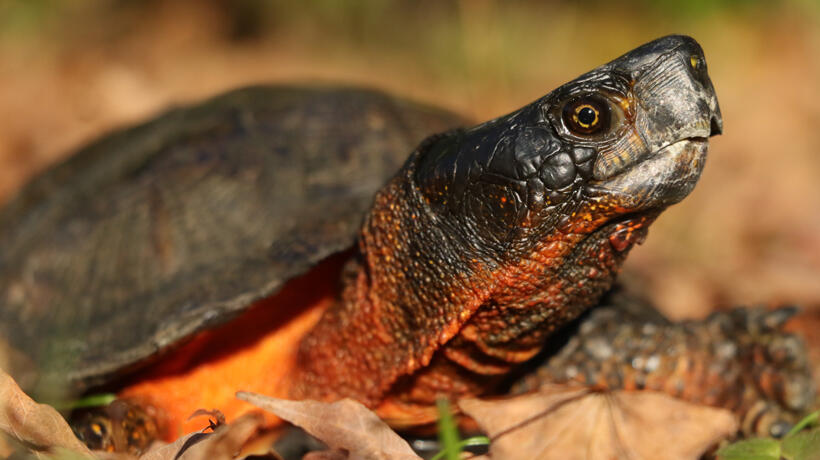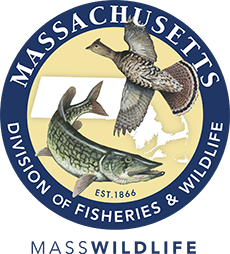- MassWildlife's Natural Heritage & Endangered Species Program
- Division of Fisheries and Wildlife
Media Contact
Media Contact, MassWildlife

Once abundant in many rivers and streams in Massachusetts, over the past few decades wood turtle populations have experienced serious declines throughout their range from Virginia to Nova Scotia. The major contributing factors include habitat fragmentation from human development, dam construction, and illegal collection from the wild. The wood turtle has been designated as a Regional Species of Greatest Conservation Need by the Northeast Association of Fish and Wildlife Agencies and conservation partners across the northeast states have been helping this rare turtle by finding ways to work together.
The US Fish and Wildlife Service recently selected a Competitive State Wildlife Grant for funding entitled “Regional Conservation for Wood Turtles and Related Emydine Turtles” led by the Massachusetts Division of Fisheries and Wildlife (MassWildlife) along with other partner state agencies in the northeast. The multi-year grant will provide a more strategic approach to conserving important populations and minimizing declines. Partners will follow recommendations in their regional conservation plan for the wood turtle, developed with support of an earlier Competitive State Wildlife Grant.
“For over 10 years, the northeastern states have been working together to identify, prioritize, and implement conservation actions for wood turtles,” said Mike Jones, State Herpetologist for MassWildlife. “This Competitive State Wildlife Grant will allow us to implement time-sensitive actions at the region’s most important wood turtle sites.”
The Northeast Wood Turtle Working Group has collaborated on data collection techniques, analyzed data from thousands of field surveys by volunteers and biologists, and began a comprehensive genetics analysis to identify relationship patterns between wood turtle populations in different places.
Actions to support wood turtles will benefit other species as well, including freshwater mussels, fish, amphibians, and other turtle species.
In addition to habitat protection, restoration, and voluntary technical assistance to interested private landowners, the project involves specific efforts to mitigate road mortality and illegal collection of wood turtles.
As part of a coordinated response to this threat, the grant will support housing of up to 50 confiscated wood turtles for up to three years in a secure facility run by trusted partners. Bristol County Agricultural School in Dighton, Massachusetts, has worked with MassWildlife for the past decade to provide temporary foster homes to hatchling endangered northern red-bellied cooters (another native turtle) as part of a successful restoration effort.
“Whatever is helpful to the turtles and to MassWildlife is a good educational experience for our kids,” said Bristol Aggie’s Natural Resource Department Chair Brian Bastarache, who oversees the school’s turtle project operations. “This is real conservation work that gives them an opportunity to apply what they learn in classroom.” The school is currently undergoing a major capital improvement project on campus, including four new labs that will quadruple their holding capacity for turtles.
Fittingly, care and feeding for continued collaboration between states is another element of the grant. For example, a turtle conservation meeting will be held in 2022 on wood turtle and related high-priority turtle species. This event will bring together experts and specialists from across the range who are working on similar problems and will result in new partnerships and conservation projects across state lines.

